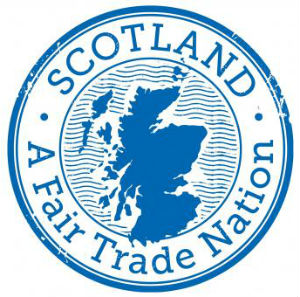Scotland as a Fair Trade Nation

Student reporter Callum Aitken explores what it means for Scotland to be a Fair Trade Nation, and what you can do to be part of it.
In February 2013, Scotland became the second country (after Wales) to achieve Fair Trade Nation status. The award was the result of a movement that has its origins as far back as the 1960’s, when Oxfam shops first began selling Christmas cards made in developing countries. Since then, organisations such as Traidcraft, the Fairtrade Foundation and Oxfam have helped increase the visibility of Fair Trade throughout the UK, whilst the establishment of the Scottish Fair Trade Forum in 2007 helped drive a political agenda to make Scotland a Fair Trade nation.
The achievement is a result of what the Scottish Fair Trade Forum claims to be a positive change in the perception of Fair Trade in Scotland in recent years. For instance, Fair Trade is more present in schools and supermarkets, and there is less scepticism surrounding the reliability and effectiveness of buying Fair Trade products. Statistics also claim that 81% of Scottish people are aware of Fair Trade products, whilst 25% of Scots now buy Fair Trade products at least once a week.
As such, after several years of hard campaigning, Scotland achieved Fair Trade Nation status after meeting the (rather thorough) criteria laid out by the Scottish Executive and Welsh Assembly in 2006. Indeed, in order to achieve the award, Scotland had to ensure that all six major cities and 18 of its 32 councils had garnered Fair Trade status and that 75% of Scots buy Fair Trade products at least once a year. The criteria also laid out standards for the Scottish Parliament to adhere to including actively promoting Fairtrade Fortnight and producing an annual report in support of Fair Trade.
Yet, despite these achievements, it is often easy to let Fair Trade (and the ubiquitous Fairtrade logo) slip into the background when in search for a cheaper deal in the supermarket, or in favour of buying locally and organically. What does Scotland becoming a Fair Trade nation mean, therefore, for someone living in the City of Edinburgh? More importantly, how can we get involved in making sure Scotland lives up to its name as a Fair Trade Nation?
There are numerous ways to support Fair Trade in Scotland. The most basic way is by looking for Fair Trade products during your daily shop. The organisation Fairtrade now labels a wide range of products from peanut butter to footballs! Several supermarkets, such as the Co-operative and Sainsbury’s, have pledged their support to the Fair Trade movement, stocking a variety of these products in each of their stores. And, if that’s not enough, in Edinburgh you can also visit the “One World Shop” – one of Scotland’s first specialist Fair Trade shops – at St John’s Church, Princes Street.
As Scotland’s first Fair Trade University, the University of Edinburgh is also at the forefront of promoting Fair Trade in Scotland. Indeed, recent academic events such as the Our Changing World public lecture given by Professor Michael Northcott entitled “Fair Trade or Free Trade? Competing Moral Economies in a Changing World”, highlights how the University aims to be actively engaged in debates at the forefront of fair trade and development. The University and EUSA strives to organise a variety of activities designed to engage students in fair trade. By attending any one of these events, you are helping to promote the issue of fair trade not only in the University, but also in the wider community of Edinburgh. The staff-student Fair Trade Steering Group, which meets at least three times per academic year, is also a good space to discuss and keep up to date with the University’s approach to fair trade.
Finally, by being the second Fair Trade Nation in the world, Scotland is also now at the heart of the Fair Trade movement. Yet, this achievement goes beyond a simple label. Rather, it signals that Scotland is prepared to take an active leadership role in challenging global poverty and recognising the dignity and rights of producers through a commitment to fairness in international trade. It is important, therefore, as residents of Scotland, that we support campaigns such as ‘Fairtrade Fortnight’, which is organised every year by the Fairtrade Foundation. In 2014, ‘Fairtrade Fortnight’ shall run between 24 February and 9 March and marks the launch of the “Abolish the Unfair Banana” campaign. The Fairtrade website offers numerous simple ways for people to get involved in the run up to ‘Fairtrade Fortnight’ such as downloading stickers and manuals. It promises to be a busy and exciting fortnight and an event that the University of Edinburgh will definitely be involved in! You can check out last year’s website to get an idea of some of the events that will be taking place in 2014.
It’s clear then, that achieving Fair Trade Nation status was just the start of an exciting journey. But whilst becoming one of the first Fair Trade Nations in the world is certainly a great achievement, it brings with it a set of responsibilities that must be upheld in order to ensure Scotland plays a positive role in the promotion of fair trade worldwide. Hopefully this article has shown that there are numerous exciting ways that students in Edinburgh can get involved in the Fair Trade movement in Scotland. Whether its contributing to the academic debate surrounding fair trade, or getting involved in campaigning there’s plenty to do that goes beyond buying the odd Fairtrade banana on your weekly shop – although that certainly does help!
- Scottish Fair Trade Forum report ‘Can Scotland call itself a Fair Trade Nation?’, Nov. 2012
- Fair Trade Nation criteria on the Scottish Government website
- Fairtrade Foundation Fairtrade Fortnight 2014 campaign
- 2013 Fairtrade Fortnight schedule at the University of Edinburgh





Recent comments